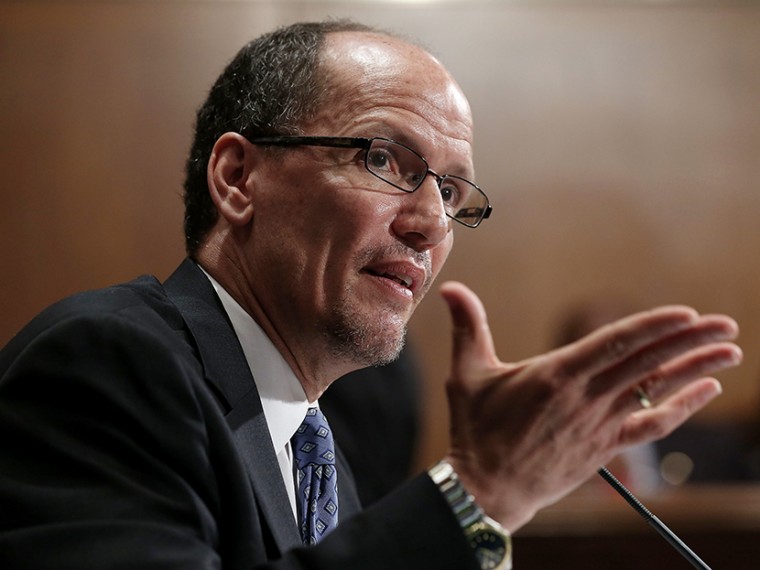The Senate confirmed Thomas Perez to be secretary of labor by a 54-46 party line vote Thursday afternoon. Perez will be the only Latino in President Obama's second-term cabinet.
Republicans were highly critical of Perez' nomination. In a floor speech in May, Republican Senate Minority Leader Mitch McConnell of Kentucky called Perez "a committed ideologue who appears willing, quite frankly, to say or do anything to achieve his ideological ends."
That Perez has become one of Obama's most controversial nominees is something of an irony. He began his career in public service under President George H.W. Bush, and garnered a reputation for being sensitive to Republican concerns as a county legislator and then state labor secretary in Maryland. Between his nominations to run the Justice Department's civil rights division and the labor department, Perez has spent almost a year of the Obama administration waiting to be confirmed. He might have spent even longer waiting without the Senate deal earlier this week that cleared the way for Perez and several other executive branch nominees to get confirmation votes.
When Perez was nominated in 2009 to run the civil rights division, Republicans held up his nomination over baseless accusations that the Obama administration had gone out of its way to protect a black separatist group, the New Black Panther Party, from voter intimidation charges. Since then, Republicans have distorted a Justice Department inspector general's report to argue that politicization in the Bush-era Civil Rights Division has persisted unchanged into the Obama administration, and accused Perez of unethically preventing the Supreme Court from hearing a challenge to the Fair Housing Act. Civil rights groups strongly backed Perez, seeing him as having revived the civil rights division following a decline in enforcement of civil rights laws during the Bush years.
Perez struck a deal with the city of St. Paul that prevented the conservative-dominated high court from hearing a case that would have put the Fair Housing Act's ban on practices that have a disparate impact on minorities in danger. The "disparate impact" standard means policies that have a greater effect on minorities can still be considered discrimination—something civil rights advocates see as key in an era where most people are clever enough not to express overtly racist sentiments.
Even though Perez cleared the agreement with ethics officials in the Justice Department before acting, Republicans still accused Perez of misbehavior, largely because they think the "disparate impact" legal standard is bogus—if you can't prove policy isn't intended to discriminate, it shouldn't count as discrimination.
Perez' confirmation leaves a void in the leadership at the civil rights division which won't be easy to fill. Anyone as committed to traditional civil rights enforcement as Perez will probably be just as controversial.
